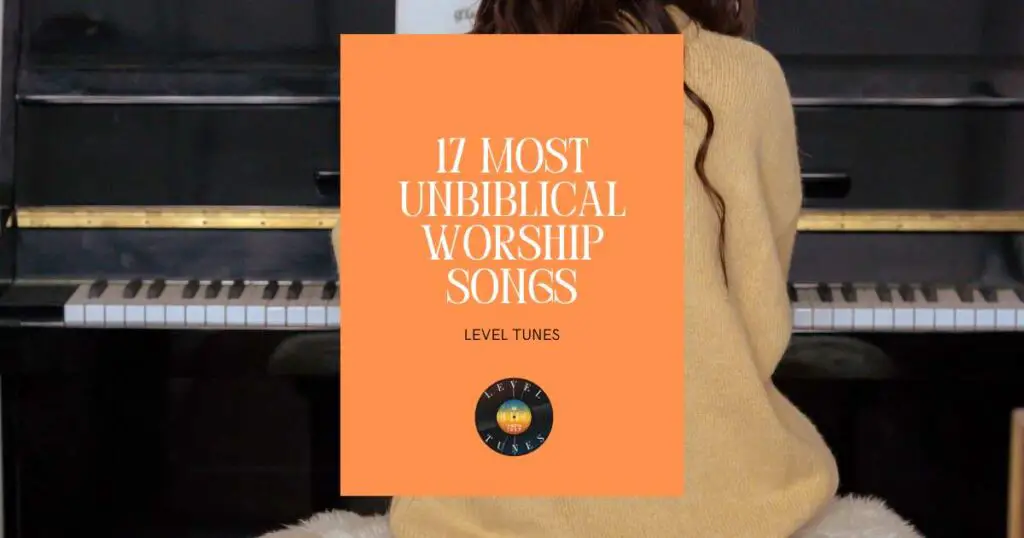17 Most Unbiblical Worship Songs: The Untold Stories
Hey there, music enthusiasts and fellow DJs! It’s TBone here from Level Tunes, bringing you something a little different and, dare I say, intriguing.
Today, I’m diving into a unique list: the “17 Most Unbiblical Worship Songs.”
Now, hold on, before you raise your eyebrows! This isn’t about stirring controversy but rather exploring how modern worship music sometimes strays from traditional biblical themes.
Being a DJ and a devout music lover, I’ve always been fascinated by the power of lyrics and melodies in shaping our spiritual experiences.
This list is a result of my curiosity to understand and share how contemporary worship songs can sometimes reflect a more secular worldview, while still resonating with many. So, let’s embark on this musical journey together, exploring the unconventional side of worship music!
Here are the most unbiblical worship songs that you can check out:
List Of Most Unbiblical Worship Songs
Most unbiblical worship songs in a list format:
1. Trading My Sorrows (Darrell Evans)
This song, known for its upbeat and catchy chorus, suggests a simple swap of sorrow for joy, which might oversimplify the complex nature of human emotions in a spiritual context. Its black-and-white view of sorrow and joy might leave some feeling that their real-life struggles are being overlooked.
2. How He Loves (John Mark McMillan)
This song has faced criticism for its challenging rhythms and vocal ranges that might not be accessible to the average congregational singer. The focus on musical complexity over simplicity can detract from the communal aspect of worship.
3. Amazing Grace (My Chains Are Gone) (Chris Tomlin and Louie Giglio)
While retaining the essence of the classic hymn, this version adds a chorus that might be vocally demanding for many. The expanded vocal range required can make it less inclusive for congregational singing.
4. Forever (Chris Tomlin)
Here’s another Chris Tomlin song criticized for excessive repetition and a melody line that stretches beyond the comfort zone of average singers. The focus seems to shift from worship to performance, making it less accessible for all to join in.
5. Oceans (Where Feet May Fail) (Joel Houston, Matt Crocker, and Salomon Ligthelm)
This song’s poetic and abstract lyrics, coupled with its musical complexity, may not resonate with everyone, especially those new to faith. It’s seen as potentially leaving some worshippers feeling disconnected.
6. Good, Good Father (Anthony Brown and Pat Barrett)
This song’s repetitive nature has been a point of contention. Critics argue that it could use more substantive lyrics about God’s nature, rather than just repeating a few phrases.
7. We Fall Down (Chris Tomlin)
The imagery and repetitiveness of this song might not appeal to newcomers or non-believers. The concern is that it lacks depth in explaining the aspects of God’s holiness.
8. Draw Me Close (Kelly Carpenter)
This song, with its intense and yearning tone, can be seen as overly personal and intimate, potentially not aligning with traditional views of worship.
9. You Make Me Brave (Bethel Music)
This song has been debated for emphasizing personal empowerment more than reliance on God’s strength. The concern is that it might shift the focus from God to self-reliance.
10. It Is Well (Bethel Music)
While based on the classic hymn, the Bethel version adds lyrics that shift the focus to a more subjective, emotional experience rather than the peace that comes from God.
11. I Could Sing of Your Love Forever (Martin Smith)
This song, famous for its repetitive chorus, has been critiqued for its lightness on truth and heavy reliance on repetition. Critics argue that while repetition can aid worship, excessive use might sacrifice the depth and specificity of truths about God’s love, which should be the focus of worship music.
12. The Church in the Wildwood (William Pitts, 1857)
This hymn, known for its nostalgic appeal, has faced criticism for creating an idyllic, almost utopian image of a church setting. Critics suggest that it might lead worshippers to idolize nostalgia and idealism, as the hymn focuses more on a building and a place rather than on Christ or deeper spiritual truths.
13. God of Our Fathers (Daniel C. Roberts, 1876)
While some patriotic hymns are seen as fitting within the mission of the church, others like “God of Our Fathers” are debatable. This hymn is appreciated for recognizing Christian heritage in the United States and calling for national submission to God, rather than mere nationalism.
14. Mine Eyes Have Seen the Glory (Julia Ward Howe, 1861)
Also known as “The Battle Hymn of the Republic,” this song is considered appropriate for congregational singing by some. It anticipates Christ’s return and calls for action against societal ills, aligning with the church’s mission to address current issues.
15. America the Beautiful
While patriotic hymns have their place in civic contexts, their use in worship is debated. Songs like “America the Beautiful” are questioned for their focus on national pride and glory, which some argue should be reserved for God alone in a worship setting.
Fun Facts: Most Unbiblical Worship Songs
1. I Could Sing of Your Love Forever (Martin Smith)
- Author: Martin Smith, the lead singer of the Christian rock band Delirious?
- Interesting Fact: This song, known for its meditative and repetitive chorus, became one of the most popular modern worship songs and was covered by numerous artists. Its simplicity and catchy melody have made it a staple in many contemporary worship settings.
2. Trading My Sorrows (Darrell Evans)
- Author: Written and composed by Darrell Evans, a prolific worship leader and songwriter.
- Interesting Fact: The song’s chorus is based on a biblical passage from the Book of Isaiah (61:3) and 2 Corinthians (4:17-18). Its upbeat and positive message has made it a favorite in many Christian gatherings, emphasizing joy in the midst of trials.
3. How He Loves (John Mark McMillan)
- Author: John Mark McMillan, an indie rock music artist known for his heartfelt songwriting.
- Interesting Fact: The song was written after the death of McMillan’s close friend, reflecting deep emotional and spiritual themes. It gained wider popularity after being covered by David Crowder Band, becoming a powerful anthem in many churches.
4. Amazing Grace (My Chains Are Gone) (Chris Tomlin and Louie Giglio)
- Authors: A reimagined version of the classic hymn by Chris Tomlin and Louie Giglio.
- Interesting Fact: This version adds a new chorus to the traditional “Amazing Grace” hymn, bringing a contemporary touch to the timeless classic. It has been widely embraced in modern worship services, bridging the gap between traditional and contemporary styles.
5. Forever (Chris Tomlin)
- Author: Chris Tomlin, a key figure in the contemporary Christian music scene.
- Interesting Fact: Known for its anthemic chorus and powerful lyrics, “Forever” is often used in Easter and resurrection-themed services. It emphasizes the eternal nature of God’s love and has become a favorite for its uplifting message.
6. Oceans (Where Feet May Fail) (Joel Houston, Matt Crocker, and Salomon Ligthelm)
- Authors: Written by Joel Houston, Matt Crocker, and Salomon Ligthelm of Hillsong United.
- Interesting Fact: The song was part of the album “Zion,” which marked a departure from Hillsong United’s usual sound. “Oceans” has been praised for its deep spiritual message and was awarded the Song of the Year at the GMA Dove Awards in 2014.
7. Good, Good Father (Anthony Brown and Pat Barrett)
- Authors: Composed by Anthony Brown and Pat Barrett, leading figures in Christian music.
- Interesting Fact: This song quickly became popular in churches worldwide for its simple yet profound message about God’s nature. Chris Tomlin’s cover version brought it to a wider audience, solidifying its place in contemporary worship music.
8. We Fall Down (Chris Tomlin)
- Author: Another popular song by Chris Tomlin.
- Interesting Fact: The song is often used in moments of reflection and adoration in worship services. Its simple structure and repetitive lyrics make it easy for congregations to sing along and meditate on the holiness of God.
9. Draw Me Close (Kelly Carpenter)
- Author: Written by Kelly Carpenter, a worship leader and songwriter.
- Interesting Fact: This intimate worship ballad quickly gained popularity in the 1990s and continues to be a favorite in many churches. Its personal and heartfelt lyrics resonate with individuals seeking a closer relationship with God.
10. He Lives
- Author: Written by Alfred Ackley in response to a conversation with a student about the reality of the resurrection of Jesus.
- Interesting Fact: “He Lives” was composed to affirm the living presence of Jesus Christ. Its chorus, “He lives, He lives, Christ Jesus lives today,” is a bold declaration of faith and has become a favorite, especially during Easter celebrations.
And that’s a wrap! We’ve explored some of the most talked-about worship songs, delving into their backgrounds and the interesting debates they stir. Whether you agree or disagree, there’s no denying the impact these songs have had on worship culture. Keep singing, keep questioning, and most importantly, keep your faith journey vibrant and alive!
Thanks for reading.
TBone




